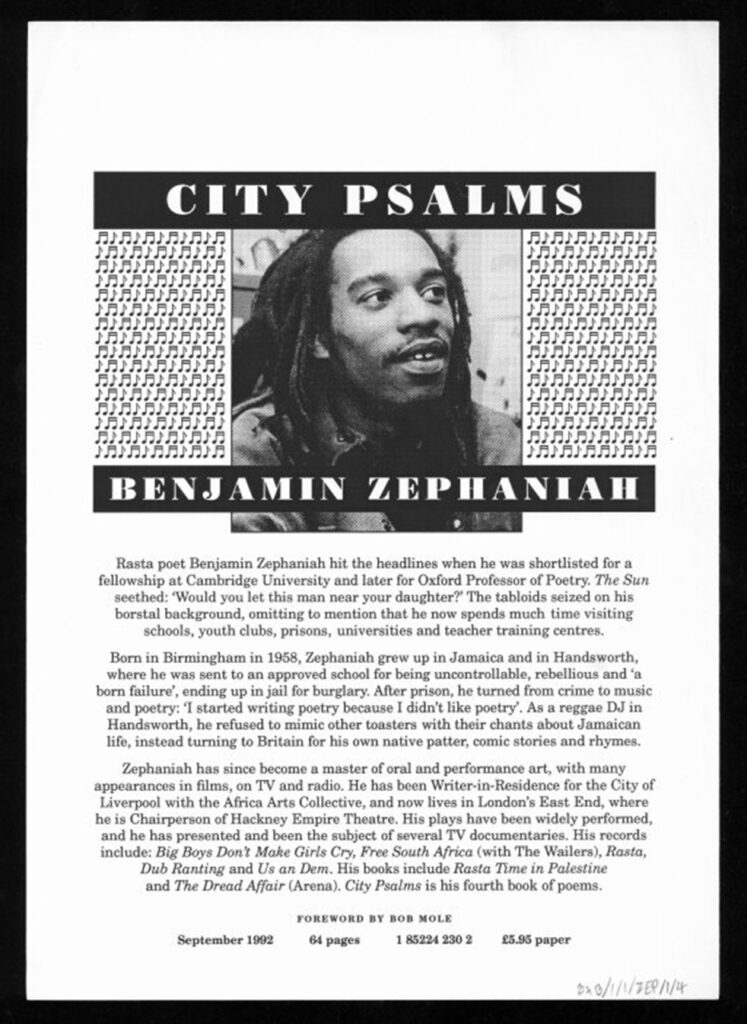In honour of the life and works of Dr. Benjamin Zephaniah (1958-2023), March 2024’s Treasure of the Month is his work from the Bloodaxe Books Archive. Benjamin Zephaniah was a dub poet born in Handsworth in Birmingham who rose to become Britain’s third favourite poet, according to a BBC poll in 2009. He was known for his hard-hitting performance poetry about race, class and injustice in modern Britain as well as his portrayal of preacher ‘Jeremiah Jesus’ in Peaky Blinders.
Zephaniah also famously rejected an OBE (Officer of the British Empire) in 2003, his response was a decisive, honest commentary focused on his relationship with empire:
“Me? I thought, OBE me? Up yours, I thought. I get angry when I hear that word “empire”; it reminds me of slavery, it reminds of thousands of years of brutality, it reminds me of how my foremothers were raped and my forefathers brutalized. It is because of this concept of empire that my British education led me to believe that the history of black people started with slavery and we were born slaves, and that we were born slaves, and should therefore be grateful that we were given freedom by our caring white masters. It is because of this idea of empire that black people like myself don’t even know our true names or our true historical culture. I am not one of those who are obsessed with their roots, and I’m certainly not suffering from a crisis of identity; my obsession is about the future and the political rights of all people. Benjamin Zephaniah OBE – no way Mr Blair, no way Mrs Queen. I am profoundly anti-empire.”
Benjamin Zephaniah, Gaurdian (2003)
The self-proclaimed anarchist’s commitment to his views extended to work that was consistently radical. Zephaniah used the controversy he inspired to fuel his work and draw attention to injustice. Of the artifacts kept in the Bloodaxe Archive, one such document is the information sheet for his 1992 collection City Psalms. In this Zephaniah actively acknowledges the racist prejudices levelled on him by tabloids such as The Sun, which is quoted directly.
The archival material on Benjamin Zephaniah at Newcastle University contains proofs of Zephaniah’s collections: City Psalms; Propa Propaganda; Too Black, Too Strong and To Do Wid Me. These collections were published by Bloodaxe Books and as such the material held also includes internal documents from within the publishing house concerning edits and forewords. These artifacts give both an insight into Bloodaxe Books’ workings and attitude to a radical poet such as Zephaniah.
Zephaniah’s social commentary covers key political conflicts over his lifetime; he was involved in Nelson Mandela’s campaign against apartheid, commented on the Israeli-Palestinian conflict and the 1990 poll tax riots, among others. His work covers all formats, printed, spoken word and digital, allowing for an accessible form of poetry that does not adhere to the traditional British literary cannon. Zephaniah commented on the need for accessibility in his poem “Dis Poetry” which he performed at Live Theatre in Newcastle in 2009.
One of the collections held in the Bloodaxe archives is Too Black, Too Strong, published in 2001. This collection was born of a residency at Tooks Barristers’ Chambers funded by The Poetry Society and as such contains poetry that comments on legal systems and notable cases that occurred during Zephaniah’s residency there. One such poem is called What Stephen Lawrence has taught us, a poem commissioned by Independent Television News for Channel 4 News which discusses the well-publicized murder of 18 year old Stephen Lawrence whilst he waited for a bus in April 1993. This attack initiated a public enquiry, resulting in the Macpherson report, which deemed the Metropolitan Police Service institutionally racist and incompetent. Zephaniah’s poem talks about the state of Great Britain after Stephen Lawrence’s murder and declares that institutional racism “is now an open secret”. Despite this damming conclusion the poem has a thread of hope running through it, Zephaniah states,
“The death of Stephen Lawrence / Has taught us to love each other” and the final stanza of the poem contains a plea to the Metropolitan Police Commissioner, Sir Paul Condon asking him to “Pop out of Teletubby land, / And visit reality”.
The vibrant life of Benjamin Zephaniah will leave an imprint on Britain’s art and literary scene for generations to come, his infectious passion for the work that mattered, for the future of the British people and for the potential they have, will, I hope, never be forgotten.
The artifacts surrounding Benjamin Zephaniah’s work are accessible via the Special Collections Reading Room at Newcastle University, and his spoken word poetry is available through Bloodaxe Books’ YouTube channel or Zephaniah’s own website.
Written by Charlotte Davison, PGR student at Newcastle University English Literature, Language and Linguistics.


